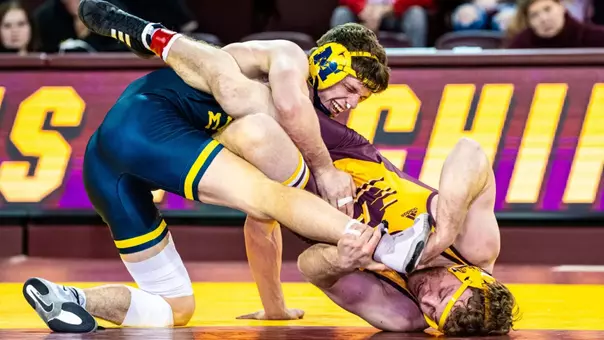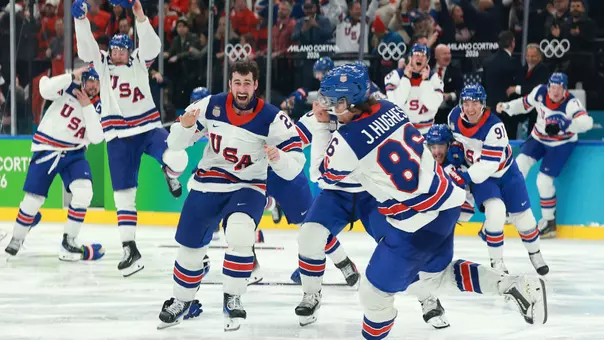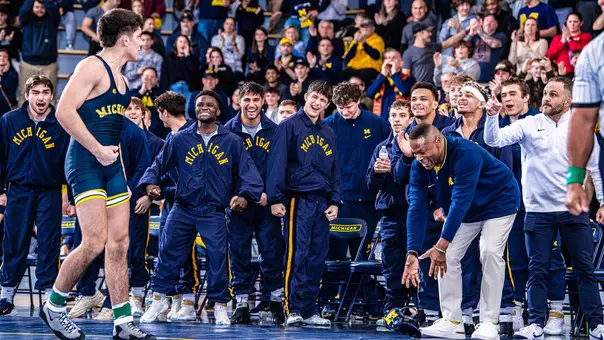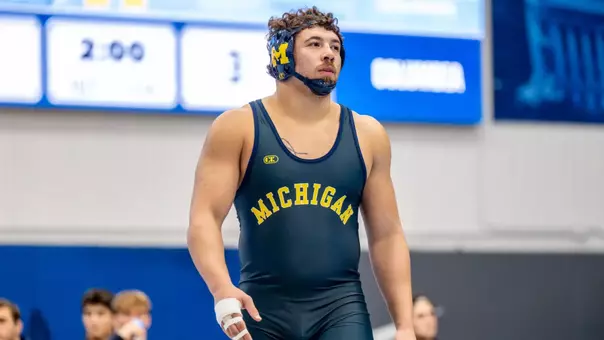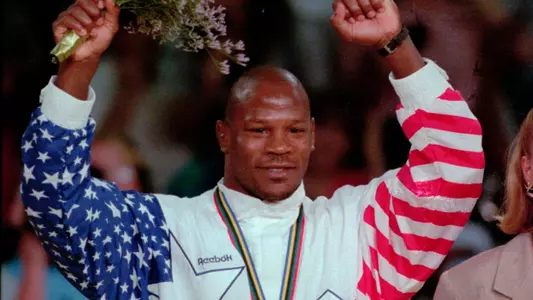
My Medal Moment: Kevin Jackson
8/6/2024 4:05:00 PM | Wrestling, Olympics
Kevin Jackson, who enters his fourth season as an assistant coach with the Michigan wrestling program, captured the 82kg/181-pound gold medal at the 1992 Olympic Games in Barcelona and claimed 82kg titles at the 1991 and 1995 World Championships. After retiring from competition, he spent 15 total years with USA Wrestling's freestyle program in several coaching capacities, including eight as USAW National Freestyle Coach (2001-08). Jackson, considered one of the greatest freestyle wrestlers in U.S. history, is a Distinguished Member of the National Wrestling Hall of Fame and the UWW International Wrestling Hall of Fame.
I won my first world championship in 1991, and that really reaffirmed for me that I was who I thought I was. I had always believed that I was the best wrestler in my weight class, so it was just a total confirmation from an achievement, effort and work standpoint that everything that I was doing was right. It also erased some memories I had of not fulfilling my dreams of being an NCAA champion.
So, going into the 1992 Olympics, I just looked at it as a realistic event for me. I knew a lot of the guys I'd be wrestling were the same guys that I had wrestled at worlds a year before, so it felt very achievable.
I always thought it was harder for me to get out of the country than it was to win at the world level. It took me three years out of college to reach the No. 1 spot in the United States, and then I held it down for five years. I was wrestling guys like Melvin Douglas and Royce Alger, who were world champions; Royce should have been a world champion. I knew if I could defeat those guys, I'd be in a great position to win just based on the quality of athletes I had to beat to make the U.S. team. Once I got to the Olympics, it almost felt like the pressure was off, and I could just go out there and try to wrestle to my potential and abilities that had developed through my challenges with U.S. opponents.
That 1992 Olympic team, we thought we were the Dream Team. We stole that name from USA Basketball. They were bringing in professionals to the Olympics for the first time, which was a thrill in itself. Charles Barkley came into the village; I got a picture with Magic Johnson, who's from my hometown, and Scottie Pippen. There was a lot of energy and intensity around the Dream Team, but we had more world championship medals and Olympic gold medals than they did, so we really felt like we were the real Dream Team.
There were guys on that team, world and Olympic champions, that I had always looked up to -- Kenny Monday, John Smith, Bruce Baumgartner -- so I would watch what they did. I realized that I was training just as hard and just as smart as they were, maybe even more so. So, again, it just reaffirmed and gave me more confidence that I was doing the right things in preparation for the Olympic Games.
I had some adversity early the tournament. Going in, I had a fever of 102 degrees and was just feeling pretty sick overall. On top of that, before my first match, I realized right away that I had lost my mouthpiece; I'm used to wearing a mouthpiece every single match, so that kind of threw me off as well. My first match was against Turkey's Sebahattin Öztürk, and it was my toughest match there. To this day, it's the proudest of my wrestling career. He ended up winning the world title the following year.
I had taken him down in the first 30 seconds. Then at the two-minute mark -- this was when it was five-minute matches with no break -- I looked up at the clock, there were three minutes left, and I was just exhausted. I won the match 1-0 but I had beat him off me for three minutes and had make sure to talk to myself the right way, tell myself to just suck it up and get through the match. I was pretty down about how I competed afterward. I went in the locker, still exhausted, and all Dave Schultz kept saying was "You're a stud, man. You got it done. You're the man, you got it done," and it was a good reminder that it's not just about the technique, the skills, the training; it's about the mental preparation. It's about how deep can you dig to pull a victory out.
I won my next match 4-3 against Poland. It wasn't actually that close. I was winning 4-0, trying to put some icing on the cake, and we got into a scramble situation where they gave him three points for feet-to-back. I thought those were my points. That was the last action of the of the match, so it didn't cost me, but it made that match look closer than it really was. I still wasn't quite feeling my best and got tired at the end of that match as well. I remember telling the reporter at that time that my job is to win and advance. It didn't matter what it looked like. So, I was able to compete and stay alive that way. Not my best but able to focus on the next match to come.

We were wrestling a three-day tournament, weighing in at scratch weight every day, and each day I was feeling a little bit better. So, I was starting to feel myself again against Canada and Spain. Neither was the highest level of competition, so I did what I was supposed to do to win. In the match against Spain, I got 2-3 takedowns and had a chance to turn him a couple of times. Then it got a little physical. He pushed me, so I pushed him back. Remember we were in Spain, so automatically the crowd was against me. That didn't bode well for me getting to the finals either.
My last opponent before the medal round was Iran's Rasoul Khadem, and that was a tough match. He took me down early, and in those days, defense won championships more than offense. So, if you had a lead of 1-2 points and you had great defense, you would go into a shutdown mode and try to expose the guy with your counter offense or find some openings. He jumped out on me 1-0 right away, so for the rest of the match, I had to chase him down. Fortunately, I was feeling a lot better, and I had a lot of confidence in my conditioning. I chased him down and scored, then everything changed because now I had the lead. He attacked me, I countered him. He attacked me again, I countered him and won 3-1. Under the current rules, that score would be 6-2, which looks a lot better. He was only about 19, 20 years old and ended taking true bronze that year, then he went on to become one of Iran's greatest wrestlers when he moved up to 197 pounds -- an Olympic champion in 1996 and two-time world champion.
Before my gold-medal match, I was so amped and excited that I almost started crying. I was trying so hard to keep my calm and stay relaxed, but my emotions nearly took over. But once I hit the mat, I was able to refocus and compete accordingly. The match was very, very tactical, and my opponent, Elmadi Zhabrailov from Russia, had been a world champion a few years earlier and was probably the best wrestler overall that I've ever faced. He was the kind of guy that if he got his hands locked on the leg, he was almost guaranteed to score, even from his stomach. So, I knew that I had to stop him from getting his hands locked. I had to continue to look for my attacks; he was also very solid defensively. That match was about not making mistakes and trying to capitalize when I had opportunities.
There was some controversy late in that match because he got to my leg, and we ended up going out of bounds. It's always a little gray in that situation. They could have awarded him a point; we would have argued it, obviously, but they could have chosen to do that. He was in on my legs, and we went out of bounds as I'm fighting him off. One official said he didn't see a point, asked the other official if he did, and he also said no. So, going into overtime, I felt comfortable, but I also knew that there was pressure on me to score. If ended 0-0 and came to a referee's decision, I wasn't going win that match. Bobby Douglas was yelling the whole time to shoot a double leg. I set him up strong and took him down clean. I held him down as long as I could because I didn't know if they were going to award me that point. It was a totally exhilarating moment when they blew the whistle and I knew I'd won the match.
Everything I had visualized training in the wrestling room as far as my celebration happened right after that match. Every day after practice, I had walked around the room, nobody else would be in there, and I raised my hands above my head and say "Kevin Jackson, Olympic champion." Looking at photos later on, the exact way I visualized it was exactly how it played out and looked on film. In that moment on the mat, it was just pure joy and pure excitement, almost like floating on a cloud.
I started to feel the real significance of it all either that evening or the next day during the closing ceremonies. The closing ceremonies are a lot different than opening ceremonies. It's much more relaxed, almost a celebratory party-type atmosphere. All the delegations attend, but instead of going to the stadium floor, they sit anywhere they want in the stands -- you don't have to be with your delegation, you're just with anybody from anywhere in the world. Right before closing ceremonies start, there are still events going on. So, I was just relaxing the stadium, and I noticed how well dressed the officials were in their coat and ties. I saw runners warming up on the track and a pole vaulter go over a bar and a javelin flying through the air. Only then did it really hit me, these were the great games that Jesse Owens, Muhammad Ali, Jim Thorpe and Mary Lou Retton had all competed in, and now I am part of that same history. It was an overwhelming feeling and the greatest sense of achievement I have ever experienced in my athletic career.

This Paris Games will be my seventh Olympics as an athlete or coach. I find it a lot more stressful as a coach than it ever was as an athlete, just because there are so many things out of your control. It's the Olympic Games, you're among the best in the world. Athletes have to have a certain skill set to even compete at this level, but that's the easy part. The bigger challenge is can I get between their ears and help them really understand that it's just another wrestling match, and you've been doing this your whole life. Things are going to happen. Will you react instinctively from habit when they do? Will you talk to yourself the right way when those same feelings of stress, anxiety and fatigue hit you? Can you operate within those? The technical part is the technical part. The biggest part is understanding it's going to get hard and not conceding anything. So that's what we as coaches try to feed into them.
The best part about the Olympics for me is all the positive energy that surrounds the whole event. It's the way the world should be. We're all living in one community inside the village. All these different countries. You can feel the electric energy just from the combat going on everywhere. If you can adjust to it and not allow it to be a distraction -- and there are going to be lots of distractions: the opening ceremony, television cameras everywhere, people winning gold medals all around you -- those are the most relevant pieces that you need to have. If you can't absorb that and deal with those things correctly, you're not going to win.
It is an absolute thrill and incredibly rewarding to see your guys accomplish their goals, be a small part of that and witness the work and the struggles that went into it. Championships are never promised and there are so many variables -- at that level, the variables and details are so small -- and with the guys that I have won with, it was never easy. I've seen Cael, Brandon Slay and Henry Cejudo on their worst days along with their best days. I think you grow a closer connection from the losses, the tears and the other anxieties and stress that comes along with the pursuit of those medals. Most of the time and for most wrestlers, it's not rewarded. But when it does happen, that's what makes it even more gratifying to see an athlete experience that overwhelming sense of achievement and satisfaction for the work they put in.

